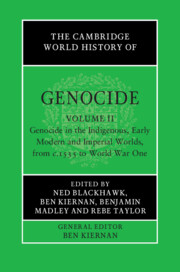Book contents
- The Cambridge World History of Genocide
- The Cambridge World History of Genocide
- The Cambridge World History of Genocide
- Copyright page
- Contents
- Figures
- Maps
- Tables
- Contributors to Volume ii
- Introduction to Volume ii
- Part I Settler Colonialism
- Part II Empire-Building and State Domination
- 4 A Case Lacking Contemporaneous Local Sources
- 5 Atrocity and Genocide in Japan’s Invasion of Korea, 1592–1598
- 6 The English Conquest of Ireland, c.1530–c.1650
- 7 Extirpation and Annihilation in Cromwellian Ireland
- 8 Genocide in the Spice Islands
- 9 ‘Too Furious’
- 10 The Destruction of Wendake (Huronia), 1647–1652
- 11 A ‘Spreading Fire’
- 12 The Qing Extermination of the Zünghars
- 13 A Vicious Civil War in the French Revolution
- 14 The Zulu Kingdom as a Genocidal and Post-genocidal Society, c.1810 to the Present
- Part III Nineteenth-Century Frontier Genocides
- Part IV Premonitions
- Index
7 - Extirpation and Annihilation in Cromwellian Ireland
from Part II - Empire-Building and State Domination
Published online by Cambridge University Press: 23 June 2023
- The Cambridge World History of Genocide
- The Cambridge World History of Genocide
- The Cambridge World History of Genocide
- Copyright page
- Contents
- Figures
- Maps
- Tables
- Contributors to Volume ii
- Introduction to Volume ii
- Part I Settler Colonialism
- Part II Empire-Building and State Domination
- 4 A Case Lacking Contemporaneous Local Sources
- 5 Atrocity and Genocide in Japan’s Invasion of Korea, 1592–1598
- 6 The English Conquest of Ireland, c.1530–c.1650
- 7 Extirpation and Annihilation in Cromwellian Ireland
- 8 Genocide in the Spice Islands
- 9 ‘Too Furious’
- 10 The Destruction of Wendake (Huronia), 1647–1652
- 11 A ‘Spreading Fire’
- 12 The Qing Extermination of the Zünghars
- 13 A Vicious Civil War in the French Revolution
- 14 The Zulu Kingdom as a Genocidal and Post-genocidal Society, c.1810 to the Present
- Part III Nineteenth-Century Frontier Genocides
- Part IV Premonitions
- Index
Summary
Allegations over atrocities committed in Ireland by the English throughout the early modern period have generated bitter debate but little genuine insight. The Cromwellian Wars of the 1650s, however, are widely acknowledged as one of the most traumatic episodes in Irish history. According to English accounts, Ireland suffered a demographic collapse in the face of total war, which included the widespread killing of captured soldiers and Catholic clergy, as well as the deliberate targeting of the indigenous community and the destruction of the country’s infrastructure. These brutal tactics triggered a major famine, which in turn enabled the spread of diseases such as plague and dysentery, killing tens of thousands in the process. Following their military victory, the English transplanted thousands of Catholic landowners, and their dependents, to make way for a new Protestant settler community, and forcibly transported significant numbers of men, women and children across the Atlantic to work in New World colonies. Few today would argue that the excesses of the Cromwellian conquest of Ireland constitute a major war crime but to date nobody has specifically charged the government of the English republic with genocide. This chapter will determine whether in fact there is a case to answer.
- Type
- Chapter
- Information
- The Cambridge World History of Genocide , pp. 163 - 185Publisher: Cambridge University PressPrint publication year: 2023

